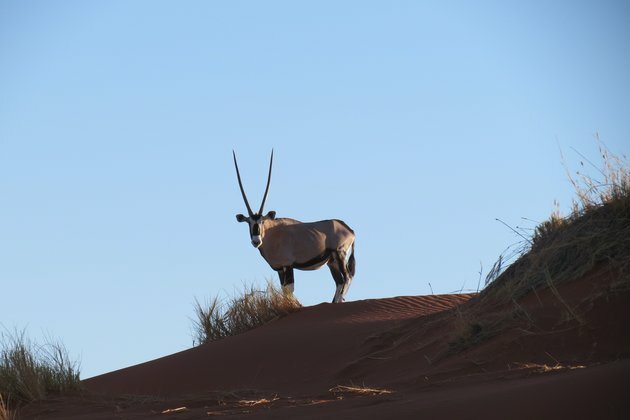How to reverse global wildlife declines by 2050
The Conversation
14 Sep 2020, 20:10 GMT+10

Species are going extinct at an unprecedented rate. Wildlife populations have fallen by more than two-thirds over the last 50 years, according to a new report from the World Wildlife Fund. The sharpest declines have occurred throughout the world's rivers and lakes, where freshwater wildlife has plummeted by 84% since 1970 - about 4% per year.
But why should we care? Because the health of nature is intimately linked to the health of humans. The emergence of new infectious diseases like COVID-19 tend to be related to the destruction of forests and wilderness. Healthy ecosystems are the foundation of today's global economies and societies, and the ones we aspire to build. As more and more species are drawn towards extinction, the very life support systems on which civilisation depends are eroded.
Even for hard-nosed observers like the World Economic Forum, biodiversity loss is a disturbing threat with few parallels. Of the nine greatest threats to the world ranked by the organisation, six relate to the ongoing destruction of nature.
Economic systems and lifestyles which take the world's generous stocks of natural resources for granted will need to be abandoned, but resisting the catastrophic declines of wildlife that have occurred over the last few decades might seem hopeless. For the first time, we've completed a science-based assessment to figure out how to slow and even reverse these trends.
Our new paper in Nature featured the work of 60 co-authors and built on efforts steered by the Intergovernmental Panel on Biodiversity and Ecosystem Services. We considered ambitious targets for rescuing global biodiversity trends and produced pathways for the international community to follow that could allow us to meet these goals.
Read more: How forest loss has changed biodiversity across the globe over the last 150 years
Bending the curve
The targets of the UN Convention on Biological Diversity call for global trends of terrestrial wildlife to stop declining and start recovering by 2050 or earlier. Changes in how land is used - from pristine forest to cropland or pasture - rank among the greatest threats to biodiversity on land worldwide. So what are the necessary conditions for biodiversity to recover during the 21st century while still supporting growing and affluent human societies?
Two key areas of action stand out from the rest. First, there must be renewed ambition from the world's governments to establish large-scale conservation areas, placed in the most valuable hotspots for biodiversity worldwide, such as small islands with species found nowhere else. These reserves, in which wildlife will live and roam freely, will need to cover at least 40% of the world's land surface to help bend the curve from decline to recovery for species and entire ecosystems.
The location of these areas, and how well they are managed, is often more important than how big they are. Habitat restoration and conservation efforts need to be targeted where they are needed most - for species and habitats on the verge of extinction.
Second, we must transform our food systems to produce more on less land. If every farmer on Earth used the best available farming practices, only half of the total area of cropland would be needed to feed the world. There are lots of other inefficiencies that could be ironed out too, by reducing the amount of waste produced during transport and food processing, for example. Society at large can help in this effort by shifting towards healthier and more sustainable diets, and reducing food waste.
This should happen alongside efforts to restore degraded land, such as farmland that's becoming unproductive as a result of soil erosion, and land that's no longer needed as agriculture becomes more efficient and diets shift. This could return 8% of the world's land to nature by 2050. It will be necessary to plan how the remaining land is used, to balance food production and other uses with the conservation of wild spaces.
Without a similar level of ambition for reducing greenhouse gas emissions, climate change will ensure the world's wildlife fares badly this century. Only a comprehensive set of policy measures that transform our relationship with the land and rapidly scale down pollution can build the necessary momentum. Our report concludes that transformative changes in our food systems and how we plan and use land will have the biggest benefits for biodiversity.
But the benefits wouldn't end there. While giving back to nature, these measures would simultaneously slow climate change, reduce pressure on water, limit nitrogen pollution in the world's waterways and boost human health. When the world works together to halt and eventually reverse biodiversity loss, it's not only wildlife that will thrive.
Authors: Michael Obersteiner - Director, Environmental Change Institute, University of Oxford | David LeclУТЈre - Researcher in Ecosystem Services and Management (ESM) Program, International Institute for Applied Systems Analysis (IIASA) | Piero Visconti - Research Scholar, Ecosystem Services and Management Programme, International Institute for Applied Systems Analysis (IIASA) 
 Share
Share
 Tweet
Tweet
 Share
Share
 Flip
Flip
 Email
Email
Watch latest videos
Subscribe and Follow
Get a daily dose of Asia Bulletin news through our daily email, its complimentary and keeps you fully up to date with world and business news as well.
News RELEASES
Publish news of your business, community or sports group, personnel appointments, major event and more by submitting a news release to Asia Bulletin.
More InformationInternational
SectionMoscow removes Taliban from banned list, grants official status
MOSCOW, Russia: This week, Russia became the first country to officially recognize the Taliban as the government of Afghanistan since...
Netanyahu vows 'No Hamas' in postwar Gaza amid peace talks
CAIRO, Egypt: This week, both Hamas and Israel shared their views ahead of expected peace talks about a new U.S.-backed ceasefire plan....
US sends message by publicizing visa ban on UK punk-rap band
WASHINGTON, D.C.: The Trump administration has made public a visa decision that would usually be kept private. It did this to send...
Tragedy in Spain: Diogo Jota and his brother die in car accident
MADRID, Spain: Liverpool footballer Diogo Jota and his younger brother, André Silva, have died in a car accident in Spain. Spanish...
Early heatwave grips Europe, leaving 8 dead and nations on alert
LONDON, U.K.: An unrelenting heatwave sweeping across Europe has pushed early summer temperatures to historic highs, triggering deadly...
U.S. military, China, Russia in Space race
President Donald Trump's plans to build a space-based Golden Dome missile defense shield have drawn immediate criticism from China,...
Business
SectionUS debt limit raised, but spending bill fuels fiscal concerns
NEW YORK CITY, New York: With just weeks to spare before a potential government default, U.S. lawmakers passed a sweeping tax and spending...
Shein hit with 40 million euro fine in France over deceptive discounts
PARIS, France: Fast-fashion giant Shein has been fined 40 million euros by France's antitrust authority over deceptive discount practices...
Meta hires SSI CEO Gross as AI race intensifies among tech giants
PALO ALTO/TEL AVIV: The battle for top AI talent has claimed another high-profile casualty—this time at Safe Superintelligence (SSI),...
Engine defect prompts Nissan to recall over 443,000 vehicles
FRANKLIN, Tennessee: Hundreds of thousands of Nissan and Infiniti vehicles are being recalled across the United States due to a potential...
Microsoft trims jobs to manage soaring AI infrastructure costs
REDMOND, Washington: Microsoft is the latest tech giant to announce significant job cuts, as the financial strain of building next-generation...
Stocks worldwide struggle to make ground Friday with Wall Street closed
LONDON UK - U.S. stock markets were closed on Friday for Independence Day. Global Forex Markets Wrap Up Friday with Greeback Comeback...













